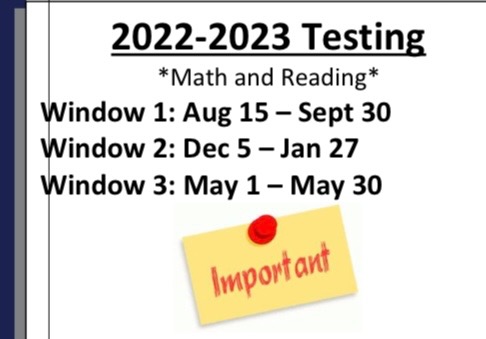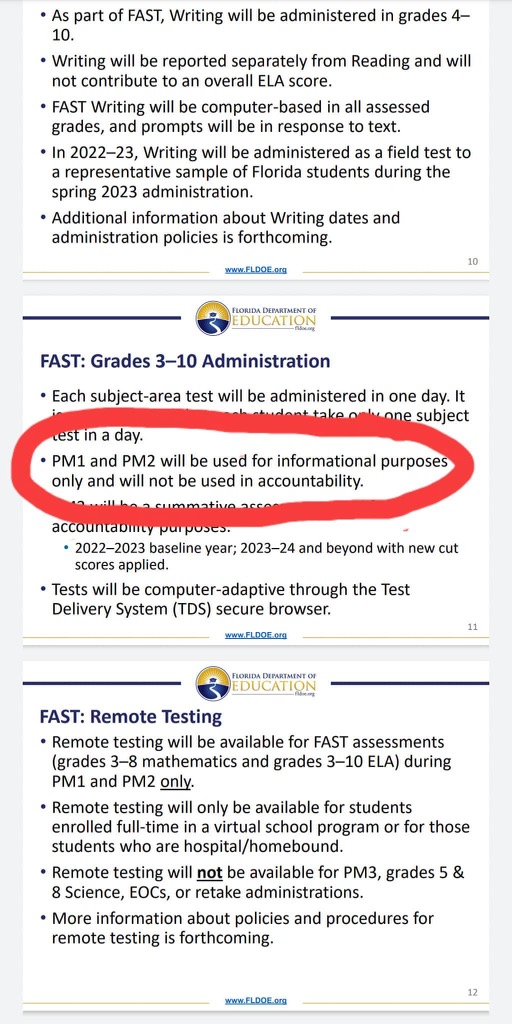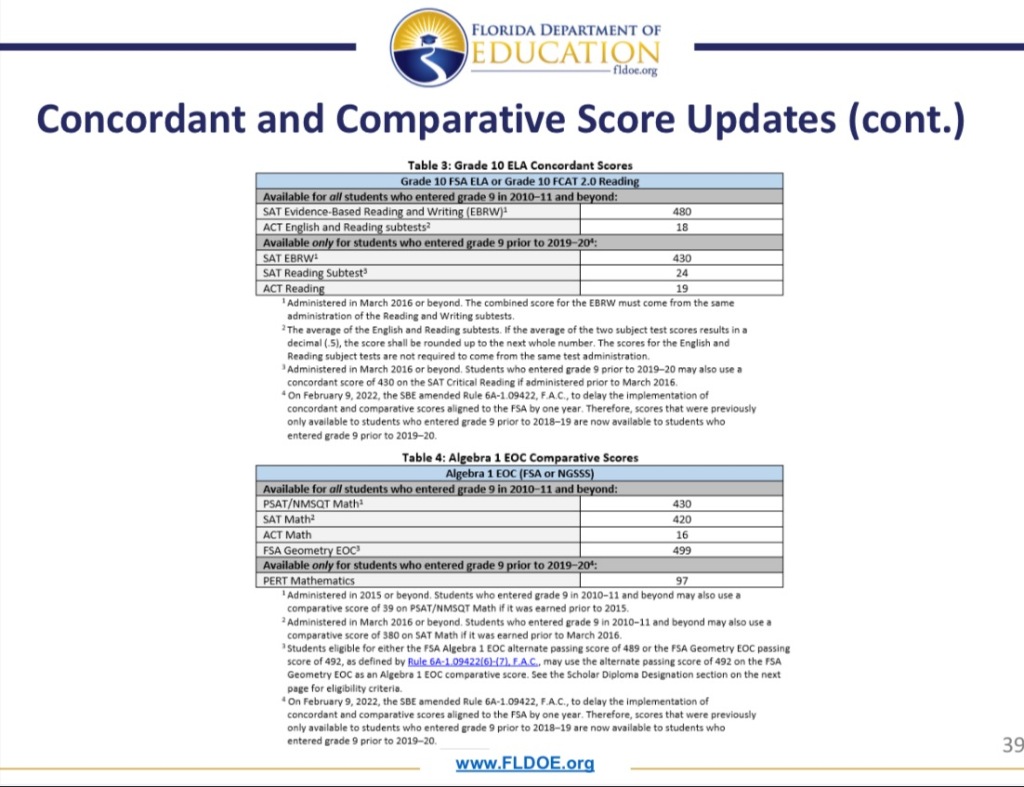Tags
Accountability, BEST, FAST, FLDOE, High stakes testing, Opt Out, Opting Out, The Opt Out Florida Network
by Sandy Stenoff
Testing began THIS WEEK.

Students will be tested NOW on everything they are supposed to know AT THE END OF THE YEAR. Students may or may not be told that there will be questions they may not be able to answer. However, they will know when they are unable to answer a question, and for some students, especially for the youngest ones, this will be devastating.
We cannot tell you to opt out or not to opt out.
No one knows yet what the tests actually look like, how a student would opt out, or what the consequences of the test will be.
We’ve compiled some of the information shared with us by teachers from across the state. We hope you read it carefully. PLEASE READ IT ALL THOROUGHLY.
In spite of the lack of clarity from the state, we do know a few things concretely:
- The test is still secret. Teachers cannot see it.
- State law still says the test is not the sole determiner of high stakes decisions such as, retention, promotion, or remediation.
- There are STILL alternative assessments to be used for good cause exemptions for promotion to fourth grade, and for other placement decisions.
__________
You may have heard that the test is “adaptive.”
Teacher 1 explains:
Opting out is a tricky concept with STAR.
The act of opting out on FSA has never been an official thing. It’s been a form of constructive refusal. By not showing up on testing day, or breaking the seal and not answering enough questions, your child wouldn’t receive a score. On the computer-based test, students simply click through without answering any questions.
HOWEVER, with STAR, there are quite a few things that prevent the same methodology from being used. Historically, each question has been timed and the computer progresses automatically to the next question once time is up.
- There is no way to skip a question without answering either.
- At the end, a score is issued even if NO QUESTIONS are answered.
- We don’t know how that score will negatively impact students.
We also know that
- STAR has been used as a method of promotion for 3rd graders who do not pass FSA.
- Mandatory retention still exists for 3rd grade, at minimum.
As for FAST, nobody has ever seen the format for it or how it’s scored.. so you won’t get any reliable advice until it’s rolled out.
We don’t even know if they can click through. FAST is supposed to be adaptive. Meaning questions get easier or harder based on responses, so you can’t actually move on without a response.
In fact, the “next” button doesn’t even show up on STAR until you click an answer.
FSA, by comparison, has the same exact question set for everyone. Same 30-32 questions. It doesn’t matter if you get question 3 wrong.. question 4 will be the same on everyone else’s.
In simple terms – if Johnny gets number 3 wrong, on a 3rd grade, 2nd month question.. or a 3.2, it would move down to a 3.1 question. If he gets it right, it moves up to a 3.3 question.
In basic application, a student can see any of 160 questions during their STAR test. Those questions could be completely different from what their neighbor sees.
There are actually 34-35 questions given out of the 160 question item bank.
In the above example.. question 4 has 2 different options. Question 5 has 4 different options, and question 6 has 8 different options. Question 7 is usually a new domain, and the pattern starts all over again.
This video has a nice visual: STAR Testing – Adaptive Testing Explained
—————
July 18 – Teacher 2:
According to what I am reading, these benchmarks are NOT tied to report cards or individual grades. That would not make sense as they are tools “meant” to drive instruction. The last session may be used to determine promotion and what that might look like for a student. (PreK-8). I do agree with the concerns about the increased responsibilities of the teachers.

Parents of students with special needs (ESE), with an IEP or a 504, should be especially concerned with the following:
Q1: If they are computer adaptive, how would a paper test be administered? What will ESE kids with IEP for paper based tests do? DOE said at the teachers workshop, they should not take test 1 and 2.
A: PBT tests will need to be transcribed within the testing windows…at least 2 people will need to be in the room to witness the transcription.
What we were told today is that, at this moment, ESE Liaisions are conducting meetings to determine the necessity of the PBT accommodation because now, the state is questioning this accommodation in cases like, the student needs PBT for state testing but participates in, let’s say iReady computer based assessments or STAR assessments…they are starting to hold schools accountable for the reasoning to decrease the number of PBT accommodations.
Q2: My daughter is in 10th and has a medical necessity for PBT. She has it on her 504 for all state testing. She hasn’t taken the FSA or iReady in 3 years. She has received PBT for her EOCs. Who, at the high school, would be able to answer questions-testing coordinator?
A: Testing Coordinator, who is usually an AP at the school.
Q3: What about for the writing portion? How are we to expect kids as young as 4th grade to not only put together an essay but “type” it out in the time frame given. They don’t type normally in school. Heck typing isn’t even taught at school.
A: The only thing I know about writing is that it too is computer based. Best guess? Lots of practice. I would also suggest reading what’s on the DOE website.
Teacher 2: District leaders have said that not taking PM1 and PM2 is for this year only if, and only if the ESE teams find that the PBT accommodation needs to stand. This is simply because the state is not ready for PBT…
Teacher 2: ESE children have accommodations for a reason. The point is … the state forgot to plan for our children!
Teacher 3: PM3 will be high stakes just like always, for kids, teachers, and schools.
Teacher 4: All sessions are considered High Stakes is what we were told today
Teacher 5: What I understand that to mean is that it will not be a “grade” for students on a report card. They may not be part of the school grade either.
Teacher 2: PM 1 and P2 (the first 2 sessions are not part of the school grade, however, the final session (PM 3) is.
__________
Teacher 6, Kelly Dunn Lowenberg:
“I hope ESE parents, teachers, students, and advocates get together and raise holy heck. A public school, county, or state can’t just say, “We don’t have an alternative.” You HAVE to. It’s a federal requirement, not an option.
I would say I can’t believe no one thought about ESE accommodations when they came up with this. However, I’m betting no one involved has ever stood at the front of a classroom, meaning they wouldn’t think about learning differences.
So yeah, I *can* believe no one said, “Hey, not all children can use computers.”
With attribution is fine- I’m out of the ed biz, so they can’t punish me.”

July 27 – Teacher 2: Re: the newest assessments called FAST:
ELA FAST is grades 3-10; Math FAST- 3-8, because some 8th graders take the ALG-1 EOC as you know.
Accountability means:
PM1 and PM2 (the first 2 testing sessions) are meant to drive instruction, however there is no real direction from the state with regard to this actually happening. There will not be a gradebook or report card grade for these 2 sessions.
The 3rd session (PM3) replaces the past “Spring FSA testing”. This is the only assessment that will count, out of these three sessions for accountability reasons: 3rd grade promotion, school grades, teacher evaluations…
Writing FAST: is separated from the ELA scores
Accommodations: there is no Paper-based accommodation for the first 2 sessions this year. There is special language from the state regarding this accom. so if your student has this or needs this, you may need to ask an admin. at your school.
Stay tuned…I’m scrolling through to see if I can answer other questions…
Teacher 3: ALL tests are computer based with results being available within 24 hours. Test questions are still considered “secure,” so the questions will not be made available to teachers and/or parents.
Teacher 6: This info was presented thru my district office and said to come straight from DOE. The state has put out the testing windows, which open as early as the end of August for some or most. Students must be assessed within this window and no other time frame. The window is about 5 days long. Remember also, that only one subject can be assessed per day and there is no answer as of yet how long the sessions will be. What is known is that there are predicted to be the same number of items, as well as the same types of items on the tests as before. In addition, each district/school must also use their own progress monitoring tool on a more scripted timeline as well. For example, some ELA students will be assessed on a weekly basis while some math students will be assessed every other week.
Middle school info…
Calculator usage: no handhelds are permitted unless it is an accommodation (NEW); also 6th graders will have a session that required the use of a calculator (NEW). Math has 2 segments, both of which will be taken in the same day, while reading has 1 session as does writing. Another change: students sitting in an advanced course (example: 6th grader taking advanced math which contains 7th grade material) will take the 7th grade FAST assessment.
So many questions…what if the student is sick during the 5 days? Is there a make up? Can they opt out? How? What grades? Are these tests used for grade promotion or graduation?
ONLY the 3rd session is used for 3rd grade promotion.
For high school students: It looks like they’ve decided to bring back PERT. This is a good thing.
Click here: to access the FOIL Statewide Assessment Update from the FLDOE to the Florida Organization of Instructional Leaders (FOIL).
Students graduating in the 2021–22 school year will be able to use a lower score on the SAT EBRW, the SAT Reading Subtest, or the ACT Reading test to meet with grade 10 ELA assessment requirement, as well as the PERT Mathematics test to meet their Algebra 1 assessment requirement.
IMPORTANT: THE INFORMATION POSTED ON THIS WEBSITE IS NOT LEGAL ADVICE.
THE FLDOE SOMETIMES MAKES CHANGES WITHOUT ADVANCE NOTICE.
PLEASE CHECK REQUIREMENTS REGULARLY AT THE FLDOE WEBSITE, ESPECIALLY FOR HIGH SCHOOL GRADUATION REQUIREMENTS.
It will take some time for us to revise the opt out guide. We are working on it. In the mean time, please keep reading and staying informed. If you find new information, please share it with us also.
IMPORTANT FLDOE RESOURCES:
